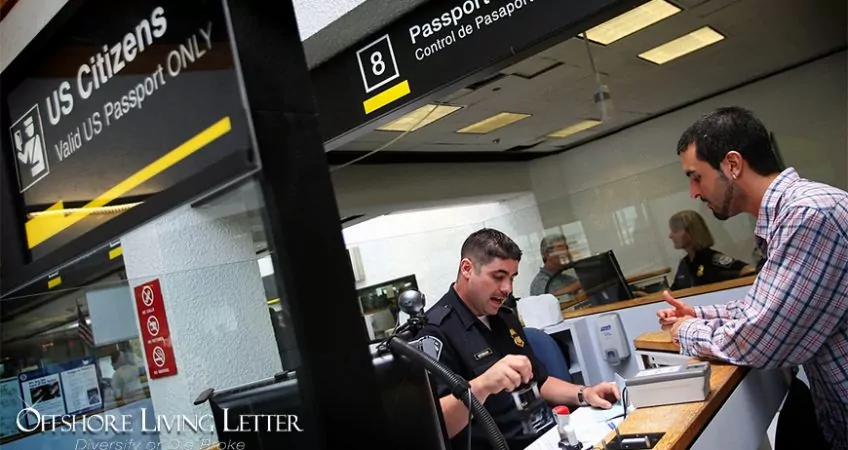
Expat’s Common Goal In Trump’s America: A Second Passport
The Most Surprising Thing About Last Weekend In Medellín
Last weekend I hosted a small group of readers at my home in Medellín, Colombia.
These Private Access members made the trip to Medellín to spend three days engaged in focused, private conversation with me and nine of my colleagues.
We discussed the basics of internationalizing your life—banking, residency, citizenship, asset protection, structures, and investing, including in real estate.
Everyone came with unique circumstances and objectives, of course. However, I was interested to discover one common denominator:
Every person in the room wanted to obtain a second passport.
Over the course of the weekend, while we were meeting, we watched the fallout play out from Trump’s temporary ban on travelers from certain countries.
As my offshore advisor colleagues and I walked through the current best options for how and where to obtain backup residency and second citizenship, our U.S. Commander-in-Chief reminded us why, in our current age, these two things are more important than they’ve ever been.
As Trump’s executive order illustrated, immigration law can change. It can change dramatically, and it can change overnight.
This is true for every country on earth. Any of us could wake up one morning to find that we’re no longer able to travel to a place where you want to go… because, thanks to some executive order, policy change, or amended legislation, we now hold the wrong passport.
Getting A Second Passport
Increasingly, a second passport is a practical necessity for anyone who wants to be able to move around and across borders without restriction.
In addition, having a second passport means a backup residency benefit. You could always decide to live in the country where you hold citizenship if you decided the country where you’ve been living no longer suits you.
A second passport means you can work without having to qualify for and obtain a work permit, and it can bring legacy benefits for your kids and grandkids.
While you can obtain residency in a country without being a citizen (and, in fact, most naturalization processes require you to be a legal resident of the country for a specified period), maintaining that residency comes with “time-in-the-country” requirements.
Some countries, including Panama and Colombia, impose minimal time-in-the-country requirements for permanent residents.
In other countries, the requirements are more onerous. Ecuador, for example, doesn’t allow you to be out of the country for more than 90 days during each of the first two years of residency.
As a citizen of a country, you can come and go as you like… including staying away as long as you like without having to worry that you’ll lose residency status.
The difficulty of obtaining a work permit varies country to country. In this regard, Ecuador shines; you don’t need a work permit to work in Ecuador if you have legal residency.
Most of those who joined my colleagues and me in Medellín over the weekend were either retired or self-employed entrepreneurs, so the options and requirements for obtaining a work permit didn’t really matter to them.
I pointed out, however, that this could matter to their children at some point.
The long-term benefits of setting your children and grandchildren up with a second citizenship are unknowable, but opening up options for their future could be the best gift you give them. More than one citizenship means greater opportunities for travel, for education, and for earning a living.
For all these reasons, as I mentioned, every one of the participants in my Private Access retreat last weekend was interested in obtaining a second passport…
And, more interesting… even surprising to me… before the weekend was over, every one of them had decided to begin the process of obtaining residency in the Dominican Republic with the intention of using that as the first step to acquiring citizenship and a passport in that country.
Obtaining DR Residency
My attorney from the DR, who only reluctantly agreed to join us for the weekend, wondering how much need could there be for a DR attorney at a wealth retreat in Colombia, was overwhelmed. She didn’t have enough application forms with her and had to organize for more.
The process for obtaining DR residency is straightforward, but it’s the quick time to becoming eligible for naturalization that gets most peoples’ attention. Qualify for one of the DR’s Fast Track residency programs, and you can apply for citizenship after just six months of residency (and you don’t actually have to be physically present in the country during those six months).
Right now a DR passport isn’t the best travel document out there. As a DR passport-holder, you can travel visa-free to fewer than 80 countries last count.
However, that number is increasing. Five new countries were added to the visa-free travel list recently, and another six countries are expected to approve visa-free travel for DR passport-holders shortly.
Meantime, the Dominican Republic is in negotiations with the EU in an effort to obtain visa-free travel status for its citizens throughout the Schengen zone. If that happens, DR passport-holders will have visa-free travel access to another 26 countries… and then to another 4 countries—Croatia, Romania, Bulgaria, and Cyprus—as soon as they complete their ascension into the Schengen zone.
At that point, a DR passport will be an excellent travel document.
Lief Simon



